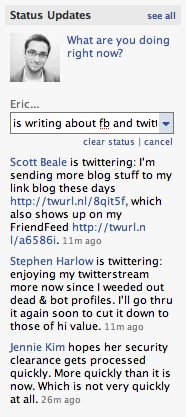Update with a response from FriendFeed’s Paul Buchheit, below the article
Facebook has just launched a new feature that lets you add actions from other sites to the mini-feed of actions on your profile, including sites like local review site Yelp, photo site Picasa, and others.
This capability, of course, is vaguely similar to what FriendFeed offers. FriendFeed lets you import actions from other sites onto its own, then track what your friends are up to around the web and discuss everything all in one place.
The problem is, Facebook is about a lot of things that distract users away from tracking what their friends are up to around the web. Distractions include: Posting messages on your friends’ walls, sending them private messages, “poking” them, playing applications with people, checking out friends’ photo albums, etc.
Facebook doesn’t have an effective way to let people easily converse about what they’re up to around the web, so I don’t think this new feature is going to mean serious competition with Friendfeed, at least for Friendfeed’s core user base. More on that in a minute.
 This Facebook move reminds me of when Facebook decided to offer a somewhat similar feature to messaging service Twitter last year, which it called “status updates.” Twitter lets you post short messages about what you’re up to, reply to others’ messages, share links, etc. It’s a sort of abbreviated, instantaneous — yet asynchronous — conversation with other Twitter users. Facebook’s updates feature, on the other hand, doesn’t offer the same dynamic. Instead, it’s more just a way for you to say what you’re up to, that others might see as they look at their news feed (which, incidentally, seems to be broken today), or as they look at your Facebook profile.
This Facebook move reminds me of when Facebook decided to offer a somewhat similar feature to messaging service Twitter last year, which it called “status updates.” Twitter lets you post short messages about what you’re up to, reply to others’ messages, share links, etc. It’s a sort of abbreviated, instantaneous — yet asynchronous — conversation with other Twitter users. Facebook’s updates feature, on the other hand, doesn’t offer the same dynamic. Instead, it’s more just a way for you to say what you’re up to, that others might see as they look at their news feed (which, incidentally, seems to be broken today), or as they look at your Facebook profile.
Twitter has been growing by leaps and bounds, and seems to be more popular than much-larger Facebook within the tech world. However, lots of people use both, even using Twitter’s Facebook application to post tweets (Twitter messages), and importing tweets into their Facebook statuses.
Here’s how this second point connects back to Friendfeed. I’ve noticed that most of my Facebook friends under the age of 26 or so don’t use Twitter — unless they’re in the tech world. But they do use Facebook’s status updates pretty religiously.
Twitter has a large niche carved out for itself, a fairly differentiated service, and solid growth. But Facebook may be pre-empting Twitter’s ability to reach college kids and other heavy Facebook users.
In the same way, Friendfeed has been growing fast in the tech world — from what I can tell — and is a valuable place for keeping track of friends. It may be that Facebook users will be satisfied enough with Facebook’s overlapping feature being released today, that they won’t feel the need to also use Friendfeed. It doesn’t mean Friendfeed is doomed, it just might reduce its potential to grow big.
Update: Friendfeed’s Paul Buchheit responds
We’ve known about this feature for a while — they pre-announced it a couple of months ago. It’s also possible to import content from these sites using third-party apps, such as http://apps.facebook.com/mypicasawebalbums/
I view aggregation more as a feature or mechanism than a product. I expect that other services will continue to add the ability to import feeds — the entire web is moving the direction of linked and interconnected services, and that is a good thing.
FriendFeed is creating an interesting and enjoyable place to share and discuss things with friends — the aggregation aspect is more of an implementation detail. As you mentioned in your article, the actual experience of using FriendFeed is very different from Facebook, and I think they have very different strengths and purposes and for the most part are headed in different directions.


